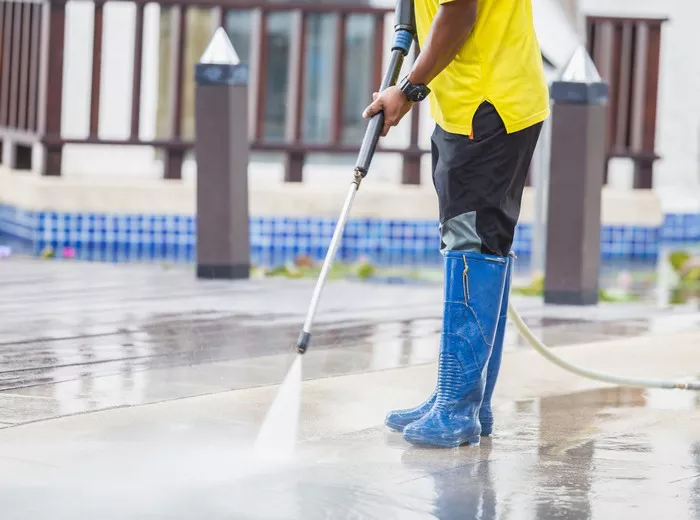Pressure washing a driveway offers several benefits that make it a popular choice for homeowners looking to maintain their property’s exterior. Not only does it enhance curb appeal by removing unsightly stains and buildup, but it also prolongs the lifespan of the driveway by preventing the accumulation of mold, mildew, and other harmful substances. One of the critical factors in achieving optimal cleaning results is understanding and selecting the appropriate PSI (Pounds per Square Inch) for your pressure washer. This guide will delve into what PSI is, how it affects cleaning power, and how to choose the right PSI for different driveway surfaces to meet your specific needs.
Understanding PSI
PSI, or Pounds per Square Inch, measures the pressure output of a pressure washer. It is a crucial metric because it directly correlates with the machine’s ability to dislodge dirt, grime, and other contaminants from surfaces. Higher PSI values indicate greater cleaning power, making it possible to tackle tougher cleaning jobs with ease.
In addition to PSI, another important metric to consider is GPM, or Gallons Per Minute. GPM measures the water flow rate of a pressure washer. While PSI determines the force of the water, GPM reflects the volume. Together, these two factors create Cleaning Units (CU), which provide a more comprehensive understanding of a pressure washer’s overall effectiveness. For instance, a pressure washer with a PSI of 2000 and a GPM of 2.0 has 4000 Cleaning Units (2000 PSI x 2 GPM), indicating its combined power and efficiency.
Choosing the Right PSI for Your Driveway
Selecting the right PSI for your driveway depends on several factors, including the type of surface, the severity of the cleaning job, the desired cleaning speed, and the user’s experience level. Here’s a detailed breakdown of how to determine the appropriate PSI for different driveway surfaces and conditions.
See also: How Long Will It Take to Pressure Wash Your Patio?
Concrete Driveways
Concrete is a durable and hard surface that can withstand higher pressure levels. For routine cleaning of a concrete driveway, a pressure washer with a PSI range of 3000 to 3500 is typically recommended. This range is sufficient to remove dirt, oil stains, and mildew without damaging the concrete.
For driveways with heavy grime, oil spots, or stubborn stains, you might need a higher PSI. In such cases, a pressure washer with a PSI of up to 4000 can be used, but caution is advised to avoid etching the concrete surface.
Asphalt Driveways
Asphalt is a softer material compared to concrete and is more susceptible to damage from high-pressure water. For asphalt driveways, a pressure washer with a PSI range of 1500 to 2000 is usually adequate. This range provides enough power to clean the surface effectively without causing pitting or dislodging pieces of asphalt.
Paver Driveways
Paver driveways, composed of brick, stone, or concrete pavers, require a more delicate approach. A PSI range of 1000 to 2000 is recommended for cleaning pavers. Using too high a PSI can displace the joint sand between the pavers, leading to instability and weed growth.
Factors Influencing PSI Choice
1. Severity of Cleaning Job
Light Dirt and Debris: For general dirt and debris, a PSI of 1000 to 2000 is usually sufficient. This range will clean the surface effectively without causing any damage.
Heavy Grime and Stains: For tougher stains, such as oil spills or mold buildup, a PSI of 2500 to 3500 may be necessary to achieve satisfactory results.
2. Desired Cleaning Speed
If you prefer a faster cleaning process, a higher PSI will provide quicker results. However, be mindful of the surface material and avoid using excessively high pressure that could cause damage.
Safety Considerations
Using the appropriate PSI for your driveway surface is not just about achieving the best cleaning results; it’s also about ensuring safety and preventing damage. High-pressure water can cause serious injuries if not handled properly. Here are some key safety considerations to keep in mind:
1. Surface Damage Prevention
Always test the pressure washer on a small, inconspicuous area of the driveway before starting the full cleaning process. This will help you determine if the PSI is suitable for the surface.
Avoid using a pressure washer with a PSI that exceeds the recommended range for your specific driveway material to prevent etching, pitting, or other damage.
2. Proper Safety Gear
Wear protective clothing, including gloves, goggles, and non-slip footwear, to safeguard against potential injuries from high-pressure water.
Be mindful of your surroundings and keep children and pets away from the area while pressure washing.
3. Technique and Distance
Maintain a consistent distance from the surface being cleaned. Holding the nozzle too close can increase the risk of damage and reduce the effectiveness of the cleaning.
Use a sweeping motion and avoid focusing the spray on a single spot for too long to prevent surface damage.
See also: Pressure Washers at Walmart
Conclusion
Choosing the right PSI for cleaning your driveway is essential for achieving the best results without causing damage. Concrete driveways typically require higher PSI levels (3000-3500), while asphalt and paver driveways need lower PSI levels (1500-2000) to prevent damage. Consider the severity of the cleaning job, your desired cleaning speed, and your level of experience when selecting a pressure washer.
Always prioritize safety by wearing appropriate protective gear and using the correct technique. For high-powered pressure washers or extensive cleaning jobs, consulting a professional can ensure the job is done safely and effectively. With the right PSI and proper precautions, pressure washing can be a highly effective method for maintaining a clean and appealing driveway.

